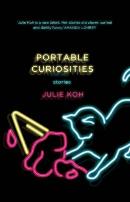 Portable Curiosities portrays a world of comic misery and brightly coloured heartache.
Portable Curiosities, Julie Koh’s debut full-length short story collection (after a capsule collection, Capital Misfits), earned her a spot among 2017’s Sydney Morning Herald Young Novelist of the Year winners. It’s an ambitious book that tackles everything: economics, consumerism, depression, the arts, sexism, racism, androids, exiled Russian orchestras illegally inhabiting the woods, mother-daughter relationships, father-son relationships, sibling rivalry, celebrity chefs, cat cafes, international relations, and the search for a parsimonious theory of life.
Together the 12 surreal-but-grounded stories in the collection provide a Kohsian worldview, tragicomic and distinct. Each story retains its edges, never blurring into the others. Koh’s writing is crisp, with technicolour detail and no time to waste. Consider the nameless narrator of ‘The Fantastic Breasts’, an adult man who seems a stand-in for many adult men, and who cuts straight to his chase:
Portable Curiosities portrays a world of comic misery and brightly coloured heartache.
Portable Curiosities, Julie Koh’s debut full-length short story collection (after a capsule collection, Capital Misfits), earned her a spot among 2017’s Sydney Morning Herald Young Novelist of the Year winners. It’s an ambitious book that tackles everything: economics, consumerism, depression, the arts, sexism, racism, androids, exiled Russian orchestras illegally inhabiting the woods, mother-daughter relationships, father-son relationships, sibling rivalry, celebrity chefs, cat cafes, international relations, and the search for a parsimonious theory of life.
Together the 12 surreal-but-grounded stories in the collection provide a Kohsian worldview, tragicomic and distinct. Each story retains its edges, never blurring into the others. Koh’s writing is crisp, with technicolour detail and no time to waste. Consider the nameless narrator of ‘The Fantastic Breasts’, an adult man who seems a stand-in for many adult men, and who cuts straight to his chase:
I’m at a conference, in the foyer, pinning on my name tag. A hundred plain-looking, spotty breasts are milling about, sipping chamomile tea from styrofoam cups. They’re all wearing far-sighted spectacles that magnify their nipples. The topic of the next session is The Difficulties of an Objectified Existence in a Patriarchal World, whatever that means.
Sexism is a pressing, tiresome issue, and ‘Breasts’ offers a fresh perspective. Its oblivious, self-revealing narrator shares the history of his destructive relationship with the likewise anonymous woman (he refers to her throughout only as the Fantastic Breasts) he first meets at the conference. The narrative is lightened by its many humorous details, including the making of the blockbuster film series based on the Breasts (including The Fantastic Breasts 3: Tokyo Drift). But the story’s core is cutting – the narrator jealously terrorises the Fantastic Breasts, verging into domestic violence before he begins, inevitably, to envision the day when he’ll have to find a younger pair. With equal balance, ‘Satirist Rising’ explores the end of civilisation, after the world has lost its imagination. ‘Civility Place’ captures the horror of being trapped in a meaningless, inescapable job in a meaningless, inescapable world. ‘The Three-Dimensional Yellow Man’ exposes Australian xenophobia through the experiences of an Asian film character who steps out of a movie theatre screen in an attempt to live a ‘three-dimensional’ life in Sydney. ‘Two’ features a poet whose work is printed on toilet paper (and who is paid with toilet paper). ‘Cream Reaper’, which was included in Best Australian Comedy WritingVolume 2, features ice-cream so good you might actually die, particularly as half the servings are poisoned. As the ‘food futurist’ chef of ‘Cream Reaper’ explains:This girl wrote that she would, and I quote, kill for one of my ice-creams and I thought … I wonder if she would literally die for one. That’s a gap in the market if I ever spied one. What if I decided to take ice-cream out of the ice-cream business and turn it into an extreme sport? What if an ice-cream existed that said to foodies everywhere: ‘How serious are you about food?’
Many of Koh’s stories feature autobiographical elements. The final story, ‘The Fat Girl in History’, reads more like non-fiction, perhaps because the narrator is an Asian woman named Julie. Other stories less suggestively based on Koh’s life have powerful moments of what feels like lived experience. In ‘The Sister Company’, Kabuki, an android therapist, is not only artificially intelligent, but artificially emotional, able to vicariously feel her clients’ struggles. Kabuki describes the life of Orla, the central character:‘You’ve lived in Sydney your whole life but you don’t have much to show for it. You wonder if this is an illusion, a nightmare. You wonder if this is a holding city, where you’re just waiting to die. You’re slowing down but the days are speeding up and blending into each other.’
If this is how the author herself has felt about her life, Portable Curiosities seems both an exploration of that nightmare and a challenge to it. Out of those sped-up, blurred days, Koh has achieved a distinctive writing voice and produced an engaging, thought-provoking collection. Portable Curiosities gives readers access to Koh’s world in all its comic misery and brightly coloured heartache. Julie Koh Portable Curiosities UQP 2016 PB 229pp $19.95 Ashley Kalagian Blunt has written for Griffith Review, McSweeney’s and Right Now. She teaches writing and public speaking, performs stand-up and has written two memoirs. Visit her website and follow her on Twitter: @AKalagianBlunt. You can buy Portable Curiosities from Abbey’s here or from Booktopia here. To see if it is available from Newtown Library, click here.Tags: Australian short stories, Australian women's writing, Julie | Koh
Discover more from Newtown Review of Books
Subscribe to get the latest posts sent to your email.






